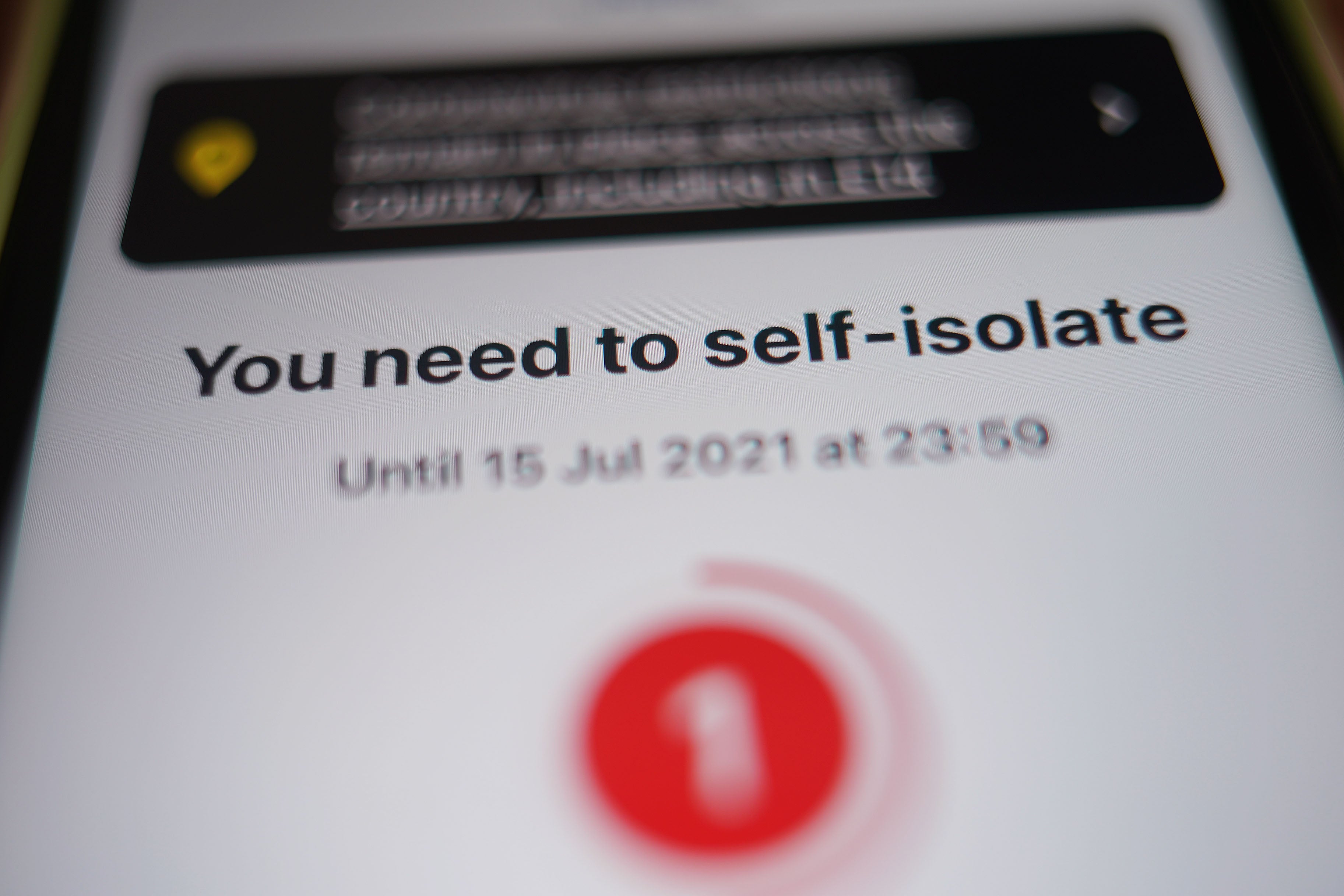People should make ‘informed decision’ if pinged by Covid app, minister says
Business minister Paul Scully said it was up to employers and individuals to decide how to respond to a notification from the NHS Covid-19 app.

People should not automatically self-isolate if they are “pinged” by the NHS Covid-19 app but should instead make an “informed decision” about what to do, a Government minister suggested.
In response to mounting concern about the impact of the “pingdemic” on businesses, the Government appeared to soften its line on self-isolation for those told to quarantine by the app.
Business minister Paul Scully said self-isolating after being told to by the app was a decision for individuals and employers.
Although it has never been a legal requirement to obey the app’s instructions, the official NHS guidance has been that people should “self-isolate immediately” when told to.
If we are visiting an elderly relative or a cancer patient then take the ping seriously but if you are doing something relatively Covid-friendly then maybe make a different decision
Mr Scully told Times Radio: “It’s important to understand the rules. You have to legally isolate if you are on the… contacted by Test and Trace, or if you’re trying to claim isolation payments.
“The app is there to give… to allow you to make informed decisions. And I think by backing out of mandating a lot of things, we’re encouraging people to really get the data in their own hands to be able to make decisions on what’s best for them, whether they’re employer or an employee.”
Asked whether this meant people should or should not self-isolate if “pinged”, he said: “We want to encourage people to still use the app to be able to do the right thing, because we estimate it saves around 8,000 lives.”
However, he added that it was “up to individuals and employers”.
Professor Sir Jonathan Montgomery, who chaired the ethics advisory board for NHSx on its contact tracing app, told Times Radio the Government needed to give clearer guidance to people about what to do when told to self-isolate.
“When we had no protection the risk was the same for everybody. If that risk is now reduced because someone is double-vaccinated it feels as though we need more sophisticated advice,” Sir Jonathan said.
“If we are visiting an elderly relative or a cancer patient then take the ping seriously but if you are doing something relatively Covid-friendly then maybe make a different decision.”
Professor John Edmunds, a member of the Scientific Advisory Group for Emergencies which advises ministers said: “Contact tracing and self-isolation play an important role in stopping cases getting out of control and preventing deaths.
“It’s important we maintain these measures as stringently as we can.
“We have one of the highest rates of cases in the world right now.
“The NHS has been under strain for a long time and they are busy trying to catch up on operations and are very, very busy.
“So to put them under more pressure now is going to be awkward.”
Meanwhile, the Prime Minister was facing a backlash over his plans to make coronavirus vaccination compulsory for nightclubs and other crowded venues in the autumn.
Clubs, backbench Tories and opposition MPs criticised Boris Johnson’s announcement on Monday – the day that clubs in England were allowed to open for the first time since March last year.
Night Time Industries Association chief executive Michael Kill accused the Government of “an absolute shambles”.
“So, ‘freedom day’ for nightclubs lasted around 17 hours then,” he said.
“80% of nightclubs have said they do not want to implement Covid passports, worrying about difficulties with enforcing the system and a reduction in spontaneous consumers, as well as being put at a competitive disadvantage with pubs and bars that aren’t subject to the same restrictions and yet provide similar environments.”
Mark Harper, the Conservative former chief whip who chairs the Covid Recovery Group of Tory lockdown-sceptics, criticised the plans as “effectively moving to compulsory vaccination”.
Former health secretary Jeremy Hunt, the Conservative chairman of the Health and Social Care Committee, questioned why the Government was delaying the plans until the autumn.
Labour’s shadow health minister Justin Madders said: “How can it be safe to go to nightclubs now, with no protective measures, if in September it will require double jab status? It makes no sense.”
Mr Scully, the minister for small business, said the policy would not be introduced until the detail is right.
He suggested that pubs would not be included, with the use of the vaccine passports aimed at nightclubs and “larger ticketed events”.
“There are a number of sporting venues that are already looking at voluntarily doing this,” he told Sky News
Mr Scully admitted to having reservations about the plan: “I’m not comfortable that Government is mandating anything frankly, I’m a very libertarian Conservative, I want to be able to back off, that’s why yesterday was an opportunity for Government to back off from so many different things and let people live their lives.
“But what we have to do is make sure that people will also live their lives safely, the NHS can function safely, and these are the challenges that we still have to do.
“So it’s incredibly frustrating, it’s incredibly complicated to work through the detail, but that’s the challenge we have.”
Bookmark popover
Removed from bookmarks